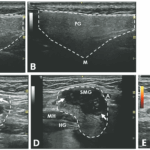In this case study, ultrasonography proves useful for excluding a diagnosis of Sjögren’s disease, leading to a correct diagnosis of IgG4-RD.


Hung Vo, MD, Zhichun Lu, MD, & Eugene Kissin, MD |
In this case study, ultrasonography proves useful for excluding a diagnosis of Sjögren’s disease, leading to a correct diagnosis of IgG4-RD.

Deborah Levenson |
Inebilizumab reduces the risk of immunoglobulin G4-related disease (IgG4-RD) flares and increases the likelihood of flare-free, complete remission at one year, a recent study shows.1 The randomized, doubleblind, placebo-controlled MITIGATE trial showed that inebilizumab reduced the risk of IgG4-RD symptoms by 87%, compared with placebo. About IgG4-RD IgG4-RD is chronic, rare condition that has, so…

Mithu Maheswaranathan, MD |
WASHINGTON, D.C.—Retroperitoneal fibrosis (RPF) is often a challenging diagnosis to make, given a lack of serologic biomarkers and often difficulty in accessing tissue for biopsy, especially in cases confined to the retroperitoneum. The topic of retroperitoneal fibrosis was discussed during the CARE to Test Your Knowledge: Retroperitoneal Fibrosis session at ACR Convergence 2024. John Stone,…

A retrospective study found serum interleukin 6 levels at the onset of IgG4-RD may significantly correlate with clinical inflammatory parameters and the involvement of the bile duct, liver and spleen…
Immunoglobulin G4-related disease (IgG4-RD) can cause fibroinflammatory lesions in nearly any organ. Correlation among clinical, serologic, radiologic and pathologic data is required for diagnosis. ACR/EULAR classification criteria for IgG4-RD have now been developed and validated in a large cohort of patients…

CHICAGO—John H. Stone, MD, MPH, director of clinical rheumatology at Massachusetts General Hospital, Boston, took the stage at the 2018 ACR/ARHP Annual Meeting to present, for the first time, a draft of new classification criteria for IgG4-related disease (IgG4-RD), a project supported by both the ACR and EULAR. Even though it was the last day…

Despina Michailidou, MD, PhD, & Paul Cohen, MD |
Immunoglobin G4-related disease (IgG4-RD) is a rare fibro-inflammatory disease of unknown etiology that has been recently recognized. It can cause fibro-inflammatory masses in almost every organ of the body and is associated with dense lymphoplasmacytic infiltration of IgG4-postitive plasma cells, storiform fibrosis and elevated levels of serum IgG4.1 IgG4-RD is a systemic disease that may…

Research suggests prednisone treatment can selectively modulate the signatures of regulatory T (Treg) cells, eosinophils and neutrophils in patients with IgG4-related disease. The results show IgG4-related disease may result from an imbalance of immune and inflammatory cells…
IgG4-related disease (IgG4-RD) is an immune-mediated fibro-inflammatory condition that affects multiple organs and can lead to tumefactive, tissue-destructive lesions and organ failure. An international panel of experts has released a consensus statement on its management…
Emine Atac, MD, and John H. Stone, MD, MPH |
What rheumatologists need to know about identifying and diagnosing immunoglobulin G4-related disease (IgG4-RD)